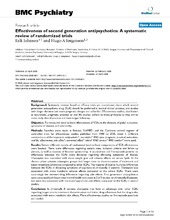Effectiveness of second generation antipsychotics: A systematic review of randomized trials
Peer reviewed, Journal article
Published version
Date
2008-04-25Metadata
Show full item recordCollections
Original version
https://doi.org/10.1186/1471-244x-8-31Abstract
Background Systematic reviews based on efficacy trials are inconclusive about which second generation antipsychotic drug (SGA) should be preferred in normal clinical practice, and studies with longer duration and more pragmatic designs are called for. Effectiveness studies, also known as naturalistic, pragmatic, practical or real life studies, adhere to these principles as they aim to mimic daily clinical practice and have longer follow-up. Objective To review the head-to-head effectiveness of SGAs in the domains of global outcomes, symptoms of disease, and tolerability. Methods Searches were made in Embase, PubMED, and the Cochrane central register of controlled trials for effectiveness studies published from 1980 to 2008, week 1. Different combinations of the keywords antipsychotic*, neuroleptic* AND open, pragmatic, practical, naturalistic, real life, effectiveness, side effect*, unwanted effect*, tolera* AND compar* AND random* were used. Results Sixteen different reports of randomized head-to-head comparisons of SGA effectiveness were located. There were differences regarding sample sizes, inclusion criteria and follow-up periods, as well as sources of financial sponsorship. In acute-phase and first-episode patients no differences between the SGAs were disclosed regarding alleviating symptoms of disease. Olanzapine was associated with more weight gain and adverse effects on serum lipids. In the chronic phase patients olanzapine groups had longer time to discontinuation of treatment and better treatment adherence compared to other SGAs. The majority of studies found no differences between the SGAs in alleviating symptoms of psychosis in chronically ill patients. Olanzapine was associated with more metabolic adverse effects compared to the others SGAs. There were surprisingly few between-drug differences regarding side effects. First generation antipsychotics were associated with lower total mental health care costs in 2 of 3 studies on chronically ill patients, but were also associated with more extrapyramidal side effects compared to the SGAs in several studies. Conclusion In chronically ill patients olanzapine may have an advantage over other SGAs regarding longer time to treatment discontinuation and better drug adherence, but the drug is also associated with more metabolic side effects. More effectiveness studies on first-episode psychosis are needed.
